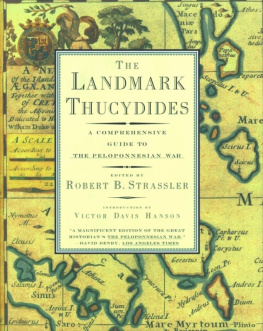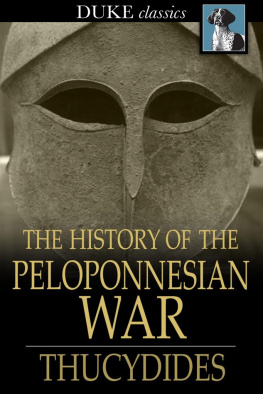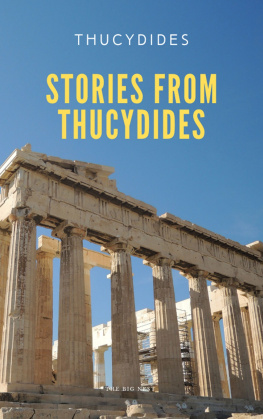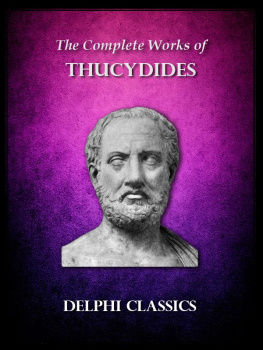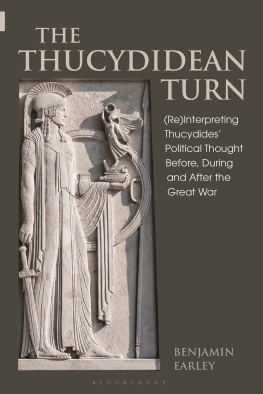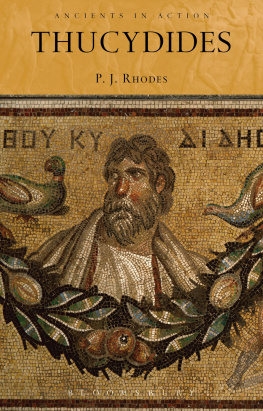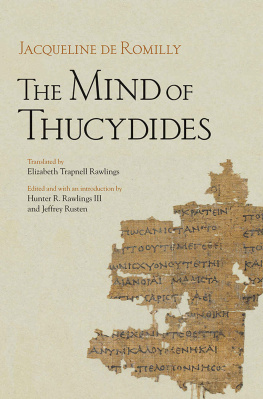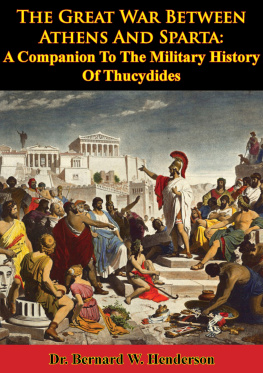THE LANDMARK THUCYDIDES
A COMPREHENSIVE GUIDE TO THE PELOPONNESIAN WAR
Robert B. Strassler
Simon & Schuster
New York London Toronto Sydney


About The Author
The editor gratefully acknowledges permission to use illustrations from various sources, as follow: 1.1: Courtesy of the Royal Ontario Museum, Toronto. 1.90: Ostia Museum. Photo Gabinetto Fotografico. 1.132: Deutsches Archologisches Institut, Istanbul. 1.135: American School of Classical Studies at Athens, Agora Excavations. 1.144: Copyright British Museum. 2.22: Photograph by David Finn. 2.44: Alinari/Art Resources. 2.69: Epigraphic Museum, Athens. 2.84: Paul Lipke/The Trireme Trust. 3.48: American School of Classical Studies at Athens, Agora Excavations. 3.86: Copyright British Museum. 4.41: American School of Classical Studies at Athens, Agora Excavations. 5.47: Epigraphic Museum, Athens. 6.54: Epigraphic Museum, Athens. 6.61: American School of Classical Studies at Athens, Agora Excavations. 8.7: Copyright British Museum. 8.8: Courtesy of Thames & Hudson Ltd. Photograph by Peter A. Clayton. Appendix G: The Trireme Trust. Illustration by John F. Coates.

TOUCHSTONE
Rockefeller Center
1230 Avenue of the Americas
New York, NY 10020
Copyright 1996 by Robert B. Strassler
All rights reserved, including the right of reproduction in whole or in part in any form.
First Touchstone edition 1998
TOUCHSTONE and colophon are registered trademarks of Simon & Schuster Inc.
Designed by Kim Llewellyn
Maps by Anne Gibson
Manufactured in the United States of America
20 19 18 17 16 15 14 13 12 11

Library of Congress Cataloging-in-Publication Data
Thucydides.
[History of the Peloponnesian War. English]
The landmark Thucydides : a comprehensive guide to the Peloponnesian War / edited by Robert B. Strassler; introduction by Victor Davis Hanson.
p. cm.
This edition uses the translation by Richard Crawley (1840-93) published in 1874CIP front matter.
Includes bibliographical references and index.
1. GreeceHistoryPeloponnesian War, 431-404 B.C. I. Strassler, Robert B., 1937- II. Crawley, Richard, 1840-1893. III. Title.
DF229.T55C7 1996
938.05dc20 96-24555

TO THE MEMORY OF SAMUEL A. STRASSLER
ISBN 978-0-6848-2790-2
eISBN-13: 978-1-439-10659-4
www.SimonandSchuster.com
CONTENTS
INTRODUCTION
I. Life
i.
Thucydides, an Athenian, wrote the history of the war is the first pronouncement of The Peloponnesian War (1.1.1). Unfortunately, the merest glimpses of our authors life follow this promising initial revelation of his name, nationality, and calling. Only at a very few unexpected places in his chronicle does Thucydides disclose somewhat more about himself. He announces, for example, that he once suffered from the great plague that struck Athens between 430 and 427 (2.48.3), the scourge that killed Pericles and thousands of his fellow Athenians (3.87.3).
Once more Thucydides, in the third person, matter-of-factly enters his own narrative during the account of the successful Spartan attack on the northern Greek city of Amphipolis (424). He tells us that:
The general, who had come from Athens to defend the place, sent to the other commander in Thrace, Thucydides son of Olorus, the author of this history, who was at the isle of Thasos, a Parian colony, half a days sail from Amphipolis. (4.104.4)
His fathers name, Olorus, is probably Thracian and royal, suggesting both a foreign and a wealthy pedigree. Thucydides confirms that standing and prestige when he explains that he was called to Amphipolis precisely because he possessed the right of working the gold mines in that part of Thrace, and thus had great influence with the inhabitants of the mainland (4.105.1).
For his failure to save Amphipolis from the shrewd Spartan general Brasidas Thucydides bore the full brunt of Athenian popular indignation:
It was also my fate to be an exile from my country for twenty years after my command at Amphipolis; and being present with both parties, and more especially with the Peloponnesians by reason of my exile, I had leisure to observe affairs more closely (5.26.5).
Later Roman and Byzantine biographies, their anecdotes and gossip unproved but not necessarily always fanciful, add a few more intriguing personal details about Thucydides life: formal philosophical and rhetorical training, aristocratic connections, a violent death, and burial at Athens. But beyond his own admitted survival of disease, battle, and exile, Thucydides tells us little else about his experience in the war years other than that he lived through the whole of it, being of an age to comprehend events (5.26.5). We should conclude that he was near thirty when the fighting broke out (431) and probably died in his sixties or early seventies in the mid-390s, with his history apparently left uncompleted.
ii.
Besides an intrinsic interest in learning more about the author of the finest history of the ancient world, we search for the elusive historical Thucydides in hopes of learning something of the mans outlook, his role in the events of his time, his association with the eminent figures of the fifth centuryindeed, anything that might shed some additional light upon the intention, disposition, and outlook of the author of The Peloponnesian War. Given that he was an Athenian during the citys greatest age; a man of some wealth, property, and important family connections; and once an official of the government with a sizable command, important friends, and apparently numerous enemies at Athens, a few inferences are in order.
Like his contemporary the Athenian playwright Euripides, Thucydides was familiar with, but did not necessarily approve of, the sophistic and rhetorical movements that were spawned by the bounty of this Athenian century. Nor does Thucydides own participation in the expanding regime of Athens suggest his agreement with an imperial democratic culture that grew out from the vast possession of subject states. Despite opportunity for profitable overseas concessions and military repute, wealthier Athenians like Thucydides probably felt more at home with a past timocratica government that had once been the private domain of property owners. As moderate oligarchs, then, they were skeptical of unpredictable democrats and any others who championed a more radically egalitarian agenda that might diminish the power of Athens upper classes (8.97.2).
For a man of Thucydides experience and upbringing, democracy worked best when nominal and under the control of a single great man like Pericles (2.65.6-13). Less responsible demagogues and politicians, like Cleon and Hyberbolus, were both unpredictable and unreliable and so to be feared (3.36.6; 8.73.3). Their stock-in-trade was the agitation of the Athenian demos, an always fickle and sometimes quite dangerous rabble (2.65.4; 2.65.10-11; 3.36.4; 6.24.2-4).

